
Filter News
Area of Research
- Advanced Manufacturing (1)
- Biology and Environment (46)
- Biology and Soft Matter (1)
- Clean Energy (29)
- Climate and Environmental Systems (2)
- Computational Engineering (2)
- Computer Science (7)
- Electricity and Smart Grid (1)
- Functional Materials for Energy (1)
- Isotopes (1)
- Materials (23)
- Materials for Computing (4)
- Mathematics (1)
- National Security (18)
- Neutron Science (11)
- Nuclear Science and Technology (4)
- Quantum information Science (9)
- Supercomputing (54)
News Topics
- (-) Climate Change (99)
- (-) Machine Learning (47)
- (-) Molten Salt (8)
- (-) Quantum Science (69)
- 3-D Printing/Advanced Manufacturing (121)
- Advanced Reactors (34)
- Artificial Intelligence (91)
- Big Data (53)
- Bioenergy (91)
- Biology (98)
- Biomedical (58)
- Biotechnology (22)
- Buildings (57)
- Chemical Sciences (63)
- Clean Water (29)
- Composites (26)
- Computer Science (187)
- Coronavirus (46)
- Critical Materials (26)
- Cybersecurity (35)
- Decarbonization (79)
- Education (4)
- Element Discovery (1)
- Emergency (2)
- Energy Storage (108)
- Environment (194)
- Exascale Computing (37)
- Fossil Energy (5)
- Frontier (42)
- Fusion (54)
- Grid (62)
- High-Performance Computing (84)
- Hydropower (11)
- Irradiation (3)
- Isotopes (53)
- ITER (7)
- Materials (144)
- Materials Science (140)
- Mathematics (7)
- Mercury (12)
- Microelectronics (3)
- Microscopy (51)
- Nanotechnology (60)
- National Security (61)
- Net Zero (13)
- Neutron Science (131)
- Nuclear Energy (108)
- Partnerships (44)
- Physics (61)
- Polymers (33)
- Quantum Computing (34)
- Renewable Energy (2)
- Security (24)
- Simulation (47)
- Software (1)
- Space Exploration (25)
- Statistics (3)
- Summit (57)
- Sustainable Energy (125)
- Transformational Challenge Reactor (7)
- Transportation (97)
Media Contacts
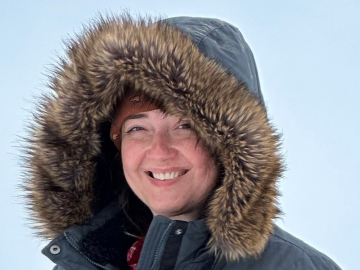
Colleen Iversen, ecosystem ecologist, group leader and distinguished staff scientist, has been named director of the Next-Generation Ecosystem Experiments Arctic, or NGEE Arctic, a multi-institutional project studying permafrost thaw and other climate-related processes in Alaska.
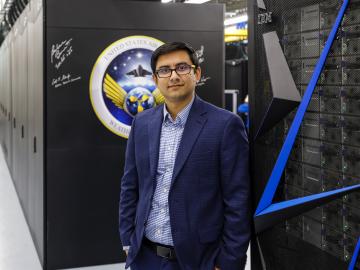
Climate change often comes down to how it affects water, whether it’s for drinking, electricity generation, or how flooding affects people and infrastructure. To better understand these impacts, ORNL water resources engineer Sudershan Gangrade is integrating knowledge ranging from large-scale climate projections to local meteorology and hydrology and using high-performance computing to create a holistic view of the future.

A study led by Oak Ridge National Laboratory researchers identifies a new potential application in quantum computing that could be part of the next computational revolution.
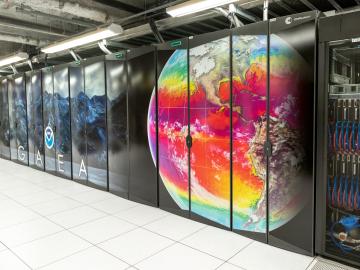
Oak Ridge National Laboratory, in partnership with the National Oceanic and Atmospheric Administration, is launching a new supercomputer dedicated to climate science research. The new system is the fifth supercomputer to be installed and run by the National Climate-Computing Research Center at ORNL.

The Center for Bioenergy Innovation has been renewed by the Department of Energy as one of four bioenergy research centers across the nation to advance robust, economical production of plant-based fuels and chemicals.
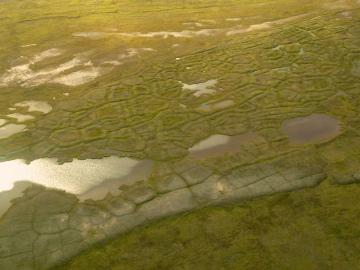
Oak Ridge National Laboratory scientists set out to address one of the biggest uncertainties about how carbon-rich permafrost will respond to gradual sinking of the land surface as temperatures rise.

A study by Oak Ridge National Laboratory researchers has demonstrated how satellites could enable more efficient, secure quantum networks.

U2opia Technology, a consortium of technology and administrative executives with extensive experience in both industry and defense, has exclusively licensed two technologies from ORNL that offer a new method for advanced cybersecurity monitoring in real time.
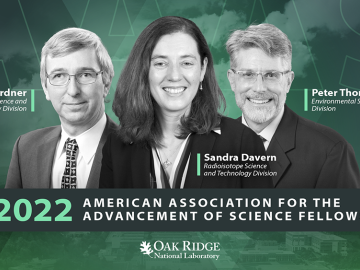
Three scientists from the Department of Energy’s Oak Ridge National Laboratory have been elected fellows of the American Association for the Advancement of Science, or AAAS.
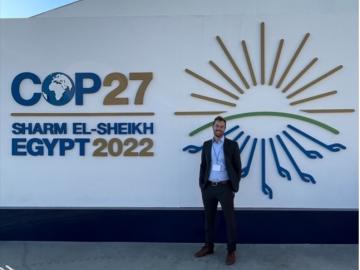
David McCollum, a senior scientist at the ORNL and lead for the lab’s contributions to the Net Zero World Initiative, was one of more than 35,000 attendees in Egypt at the November 2022 Sharm El-Sheikh United Nations Framework Convention on Climate Change, or UNFCCC, Conference of the Parties, also known as COP27.


